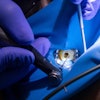Apical periodontitis (AP) may be a risk factor for cardiovascular disease (CVD), according to a study published in the Journal of Dentistry. The finding may highlight the need for stronger efforts to prevent and treat endodontic infections to reduce one’s cardiometabolic risk.
Furthermore, cardiovascular patients may benefit from a multidisciplinary screening process for AP, the authors wrote.
“Epidemiological evidence from primary studies highlights a correlation between AP and the onset of CVDs,” wrote the authors, led by Dr. Adinath Walmik Talekar of the Manav Rachna International Institute of Research and Studies in India (J Dent, June 28, 2025, Vol. 161, 105943).
This study used an umbrella review approach to evaluate existing epidemiological evidence on the relationship between CVD and AP. The goal was to determine whether a correlation exists between AP and CVD in adult patients, they wrote.
Researchers assessed AP prevalence using diagnostic tools like intraoral periapical radiographs, panoramic radiographs, and computed tomography scans. A literature search was conducted across electronic databases up to February 2025. Of 7,472 screened articles, 10 systematic reviews were included in the final analysis.
The review found a moderately increased cardiovascular risk associated with AP. Pooled data showed a 32% higher risk (relative risk, 1.32; 95% confidence interval [CI], 1 to 1.62; p = 0.007) and 83% higher odds of CVD (odds ratio, 1.83; 95% CI, 1.33 to 2.53; p < 0.001). Demographic and lifestyle factors were consistently noted as key confounders across studies, they wrote.
While primary evidence points to an association between AP and CVD, three major reviews found insufficient support for a causal link. High heterogeneity (I² = 54% to 100%) and inconsistent diagnostic criteria further limited strong conclusions.
Large-scale prospective studies using consistent definitions of AP and accounting for confounding factors are needed to better understand this relationship, the authors added.
“Collectively, the evidence supports AP as an independent, clinically important marker of cardiovascular vulnerability, justifying intensified prevention and management of endodontic infection within cardiometabolic risk reduction strategies,” they wrote.




















